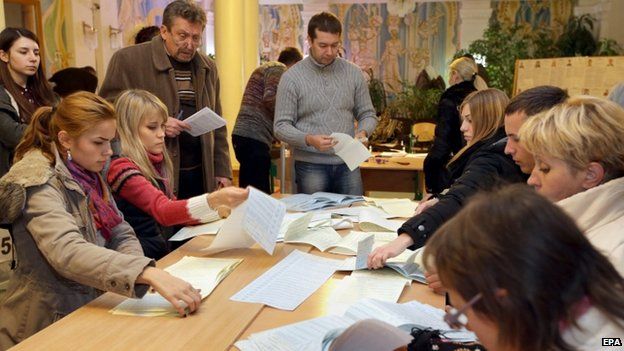Ukraine crisis: Pro-Western blocs 'win Ukraine poll'
- Published

Pro-Western parties will dominate Ukraine's parliament after the first elections to the body since February's revolution, exit polls suggest.
As votes are counted, President Petro Poroshenko's bloc looks set to win the most, with PM Arseny Yatsenyuk's People's Front party a close second.
Mr Poroshenko thanked voters for supporting what he described as a call for a reformist, pro-European majority.
About 3m people in two eastern regions ravaged by conflict did not vote.
Pro-Russian separatists in the Donetsk and Luhansk regions plan to hold their own polls next month.
Another 1.8 million people in Crimea, annexed by Russia in March, also did not take part.
Analysis: David Stern, BBC News, Kiev
Ukraine's parliamentary elections potentially could completely transform the country's political landscape. The question is, in what way.
Already this is shaping up to be the most pro-Western legislature in the country's post-independence history. Former heavy hitters, like former President Viktor Yanukovych's Party of Regions and the Communist Party, have been sidelined.
But even if the majority of the parties are pro-Western, it does not necessarily mean they're unified. Ukraine's political culture is notoriously fractious. And the issues facing the country, such as how to enact reform, battle corruption or fight the war in the east, will provide fertile ground for disagreement.
Within the parties themselves there are a number of question marks - especially among the numerous war heroes and battalion commanders who populate the candidate lists. Though their battlefield bravery is not in doubt, their political views are not entirely clear. Where they stand on the problems the country faces remains to be seen.
The vote also comes amid an energy crisis, with Russia cutting off gas supplies to Ukraine in June in a dispute over unpaid bills.
Ukraine's economy is collapsing, with GDP forecast to fall between 7% and 10% this year.
Strong mandate
Turnout in the election had reached more than 51% by close of polls, the central electoral commission said.
But the figures differed widely between east and west, with the highest percentage in the western Lviv region (about 70%) and the lowest in areas of Donetsk region under government control (about 30%).
Mr Poroshenko called an early poll in a bid to set Ukraine on a new path after the ousting of pro-Russian leaders.
Two exit polls published immediately after voting ended showed the president's bloc, comprising his own Solidarity Party and Udar, led by boxer Vitali Klitschko, leading with about 23%.
"Democratic elections for the Ukrainian parliament have taken place," the president tweeted. "I congratulate Ukrainians!"
Later he told supporters he would begin talks on forming a coalition which would be completed within 10 days, when final election results were expected.
"As recently as yesterday, I asked you to vote for a democratic, reform-minded, pro-Ukrainian and pro-European majority," he said.
"I thank you for hearing me and supporting my call. The constitutional majority - more than three-quarters of the people who cast votes - strongly and irreversibly supported Ukraine's course towards Europe."
Mr Yatsenyuk's People's Front appeared to have performed unexpectedly well, polling in the region of 21%.
The Self Help Party, based in western Ukraine, was third with more than 13%, the exit polls indicated.
Correspondents say all three groups are strongly pro-European and should give Mr Poroshenko a strong mandate to pursue democratic reforms and a plan to end the conflict in the east.
Four other party lists seemed set to enter parliament, overcoming a 5% threshold. They include the Opposition Bloc, formed by allies of ousted Pro-Russia President Viktor Yanukovych.
Its leader Yury Boyko described the elections as the dirtiest in the country's history.
The pro-Russian Communist Party failed to clear 5%, the polls said, and may be without representation in parliament for the first time.
The picture is complicated by the fact that almost half of the 450 seats are from single-member constituencies, chosen on a first-past-the-post basis.
However, 27 seats from Crimea and rebel-held areas will remain vacant.
Preliminary official results are expected on Monday.
Observers 'concerned'
Earlier in the day, Mr Poroshenko briefly visited the eastern town of Kramatorsk, in an area recaptured by government forces from separatist rebels.
International observers expressed "serious concerns" over the effect the violence in the east of the country is having on the election.
The head of an Organisation for Security and Cooperation in Europe (OSCE) observer mission, Swedish MP Kent Harstedt, said this was the most challenging of all the elections he had observed.
He feared it would difficult to reach out to hundreds of thousands of displaced people in eastern Ukraine, but also said he hoped the poll could be a turning point.
OSCE monitors were also present in Moscow to observe voting by the estimated two to three million Ukrainian citizens there.
Mr Poroshenko later voted in the capital Kiev. "I voted for a united, indivisible, European Ukraine," he tweeted.
Mr Yanukovych fled in February after a wave of pro-Western protests in Kiev triggered by his refusal to sign a partnership agreement with the European Union.
Anger in eastern Ukraine at his overthrow turned to unrest with separatists seizing government buildings and beginning an insurgency in April.
At least 3,700 people have been killed since the conflict began, including 300 killed after a ceasefire was agreed on 5 September.
On Friday Russian President Vladimir Putin said for the first time that Moscow had helped Mr Yanukovych flee.